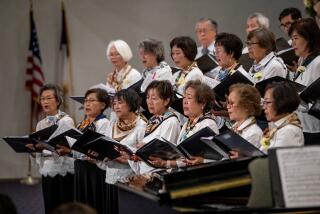Graham Finds Chinese Like His Frog Sermon
- Share via
BEIJING — Evangelist Billy Graham was at the pulpit of the Chongwenmen Church on Sunday morning, delivering his first sermon in China, when a sudden worry struck him.
Perhaps some members of the mostly Chinese congregation in this dry and dusty city might be unfamiliar with frogs, the subject of the anecdote he was about to deliver.
“I hope you have frogs here,” he said, a bit of concern and uncertainty creeping into his normally confident voice.
“A frog is a little creature that lives in the water, and he comes out onto the land and he jumps from one place to another,” he explained.
The ground thus prepared, Graham, who is on a 16-day tour of China, launched into an illustration of the nature of sin, with a translator at his side rendering each sentence into Chinese.
Analogy to Sin
“You can take a frog and put it in real hot water and it’ll jump out,” he declared, his voice once again rich with self-assurance.
“But you keep it in some cool water and gradually heat it, and you can cook him!” he exclaimed, his standing-room-only audience of about 1,600 hanging intently on every word. “And that’s the way sin is to us. It’s slow but it’s deadly.”
Graham’s sermon--a colorful but standard fundamentalist overview of the nature of sin and the meaning to Christians of the death and Resurrection of Jesus--found a receptive audience.
“He spoke about our most basic beliefs, and he spoke very well,” said Chen Zhude, 68, a retired medical doctor who converted to Christianity as a young man.
“It was very moving,” said Fu Ze, an 80-year-old woman who said she became a believer in 1934.
While Graham’s sermon was strongly theological, he also stressed ethics in a more general sense. For some non-Christians in the audience, this was the more significant part of his message.
Calls for Compassion
“Work hard and honestly and faithfully at your work,” Graham urged his listeners. “And look for ways to help other people. If somebody is sick, if somebody is very old . . . we are to help. We are to be very kind and compassionate and loving.”
Among those more interested in this portion was Yan Jiaqi, 45, one of China’s most prominent reformist intellectuals. Yan--a Communist Party member who said this was the first time he had ever entered a church--heads the Political Research Institute of the Chinese Academy of Social Sciences. His institute functions as a think tank for political reform.
“His point about how to help people love each other has value to society,” Yan said in a brief interview at the church. “People who have faith in science won’t believe in religion. But science can’t solve all the problems in the world. Religion has its use too. As to the purpose and value of life, for some people, religion satisfies their psychological needs.
“People’s behavior must be regulated not only by law,” he added. “It must also be influenced by their consciences, and this can be based either on religion or ethics. I feel that using religion to improve people’s behavior isn’t necessarily a bad thing.”
More Significant Niche
Graham--who spoke last week with scholars at the Chinese Academy of Social Sciences, with Beijing University students and with Premier Li Peng--said in a Sunday afternoon interview that based partly on those conversations, he believes that China’s leaders are sincere about allowing Christianity a more significant niche in society.
“Look what’s happened in 10 years--the growth of the churches,” Graham said. “There are these several thousand churches now open. That’s a huge step. They’ve made great progress.”
Graham said he understands that despite periods of repression, the number of Protestants in China has grown from 700,000 at the time of the 1949 Communist revolution to a current figure of about 4 million and that the number of Roman Catholics is between 3 million and 4 million.
He added, however, that although the situation has improved greatly since the end of the 1966-1976 Cultural Revolution, major restraints still exist.
“There are restrictions,” he said. “As I understand it, you are not supposed to have evangelistic meetings outside designated churches.”
Concerns of Catholics
Graham, a Southern Baptist, said that before coming to China, he also was briefed about the concerns of Catholics.
The Chinese government does not allow the Catholic Church in China to recognize the authority of the Pope. The former Catholic bishop of Shanghai, Ignatius Gong Pingmei, 87, who was released from jail in 1985 after 30 years of imprisonment for refusing to break with the Vatican, told reporters early this year that he believes that about 10 priests are still imprisoned because of their loyalty to Rome.
Graham said that in private meetings during his visit, he will speak with Chinese officials about some of the limitations on religious freedom but that he does not intend to say very much publicly on the subject.
More to Read
Sign up for Essential California
The most important California stories and recommendations in your inbox every morning.
You may occasionally receive promotional content from the Los Angeles Times.













